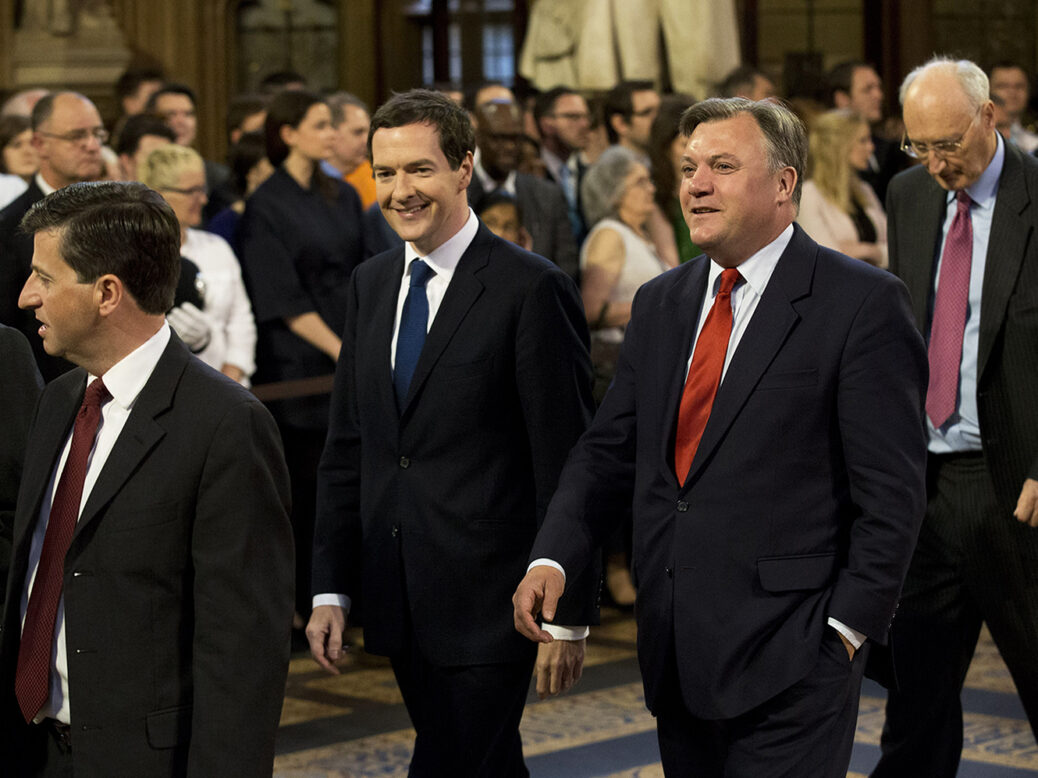
The word “frenemy” was added to the Oxford English Dictionary in 2008. It feels somewhat retro now, evoking a time when it was considered modern and edgy to blur the line between friendship and rivalry. I only mention this because back in 2008, self-defined “frenemies” Ed Balls and George Osborne probably also thought of themselves as modern and edgy. Balls was economic secretary to the Treasury under Gordon Brown and would go on to be Ed Miliband’s shadow chancellor; Osborne was about to get the keys to No 11 and was widely tipped as a future Conservative PM.
A decade and a half later, they have a podcast. It’s called Political Currency, and it follows the stunningly successful format of The Rest Is Politics, where Blairite spin doctor Alastair Campbell and erstwhile Tory heavyweight Rory Stewart “disagree agreeably” about politics to millions of eager listeners. To distinguish themselves, Osborne and Balls are focusing specifically on economics (“currency” – get it?). Apparently they “have the knowledge and experience to explain how good politics follows the economics”. A look at how their careers ended – with Balls losing his seat in 2015 and Osborne’s ascendance cut short by the 2016 EU referendum – suggests this is up for debate.
So here we have another Centrist Dad podcast where polite, reasonable men demonstrate how polite and reasonable everything could be if people just listened to them. Political lines are crossed and all parties ultimately meet in the middle of the road. Osborne is happy to reclaim the term: in a piece entitled “How I learnt to Love Ed Balls” he writes that Centrist Dad is “meant as an insult, apparently. I’m not sure why. Do we want the world run by extremist bachelors?” This from the right-wing former chancellor who slashed the state to the bone in a ditch for “austerity”, and whom we can thank for Britain’s crumbling schools, destitute local councils and creaking public services.
Balls has more claim to the economic centre-ground, but his rehabilitation as one of Westminster’s “grown-up” politicians – a cuddly, parental figure who dances badly but enthusiastically and cooks for the kids – requires more than a dash of revisionism. Back when he was in front-line politics, Balls had a reputation for thuggery that could match Dominic Raab’s. “You were a bruiser, mate,” Osborne reminds him in the trailer. “I think it was a mistake,” Balls admits, before quickly moving on to remind listeners he’s climbed Kilimanjaro with Little Mix and was crowned Best Home Cook by Mary Berry.
[See also: The Rest is Football should be sent off]
So what searing political insight do they have for us? “I think China has become a bigger concern over the last 25 years,” Balls offers, as the pair discuss the Chinese spy story and swap anecdotes about how careful (or not) they had to be about evading unfriendly eavesdroppers on government trips to Beijing. Osborne’s solution to the intergenerational row over state pensions and the unaffordability of the triple lock is a cross-party report. As for the issue that the hosts think “everyone has missed” (there will be one of these each week), they go for the global oil price. Basically, it’s rising thanks to Russia, and that’s a problem for the UK economy. “You are subject to big global forces, the decisions of other countries,” Osborne explains. “It’s just a reminder that whatever the government’s plan, which is we’re going to go into the election with inflation falling and the economy growing, the real world may come and intrude.” So governments don’t have total control over the economic situation? Who knew.
There is hardly a gap in the market for another podcast where politicos delve into the top issues of the day. If you’re listening to this one, it’s not because you’ve been craving Westminster insight that cannot be found on The Rest Is Politics, or The News Agents, or For The Many, or The Power Test, or the New Statesman Podcast come to that. And yet Balls and Osborne stand to make a small fortune each from this endeavour from a cut of the advertising. (No one knows exactly what Campbell and Stewart receive for The Rest Is Politics, but Stewart has called it “Championship footballer money”.)
Of course, the term Centrist Dad really applies to anyone who looks back wistfully to before 2016: anti-Brexit and equally horrified by Jeremy Corbyn and Boris Johnson. With this uniting them, the amount Balls and Osborne can actually disagree on is limited. They try, of course (Balls points to Osborne’s two-child benefit cap, which Osborne then reminds him is current Labour policy), but though there is the odd entertaining moment, there isn’t exactly much frisson. You can almost hear the exasperated producer in the background shouting “Come on! More arguing!” to no avail.
Political Currency is a howl of nostalgia for a bygone era: backseat driving from two men whose political careers ended dramatically far sooner than they expected (both were in their 40s when they left parliament) and who are now searching for relevance wherever it may come from. They have hardly faded into the wallpaper – Balls is a presenter on Good Morning Britain, while Osborne has had too many jobs to count, the latest being the chair of the British Museum. Diversifying into podcasts must have seemed a natural transition. I suppose it’s nice to have a hobby.
[See also: The Immortals takes a sceptical look at “longevity research”]
This article appears in the 20 Sep 2023 issue of the New Statesman, The Rise and Fall of the Great Powers





